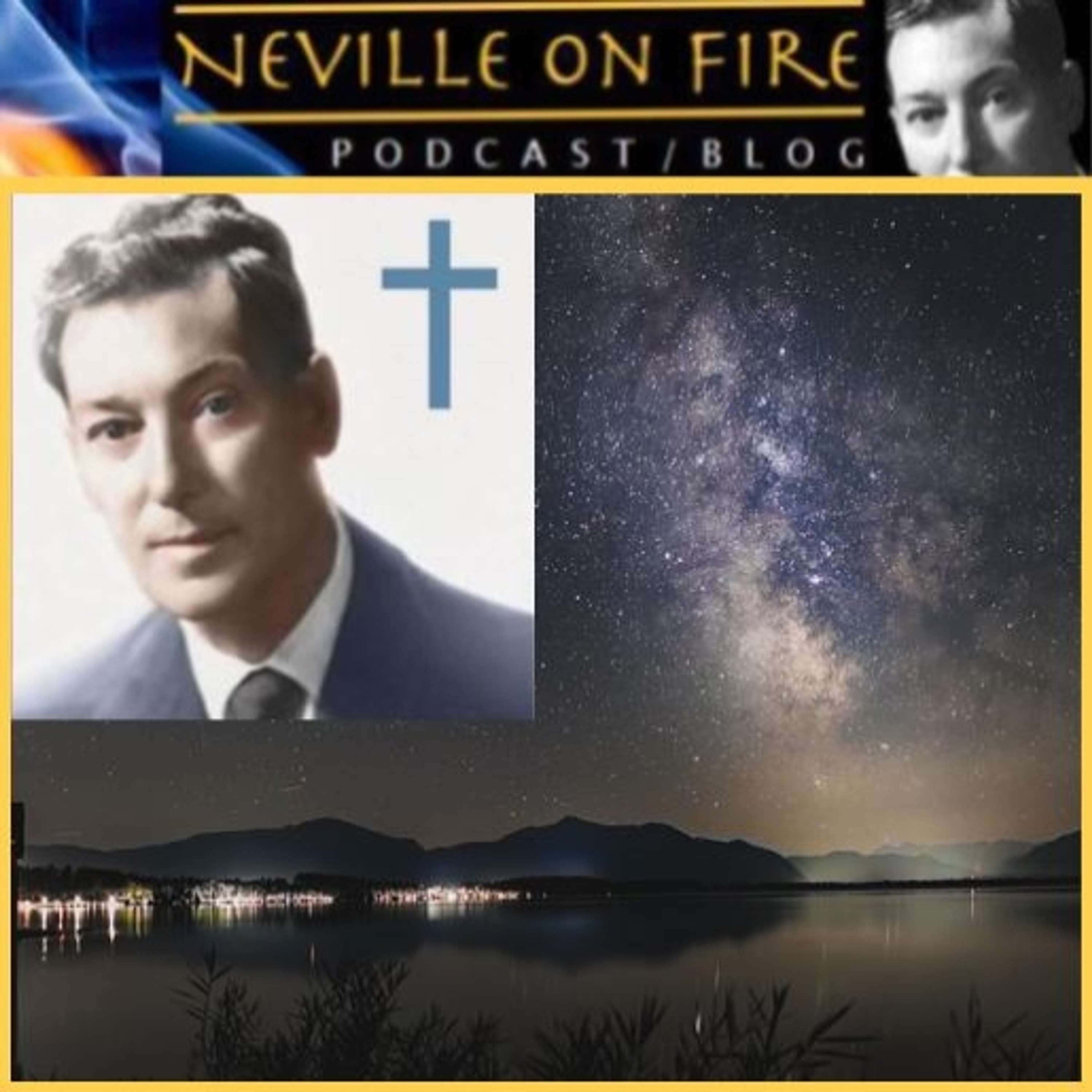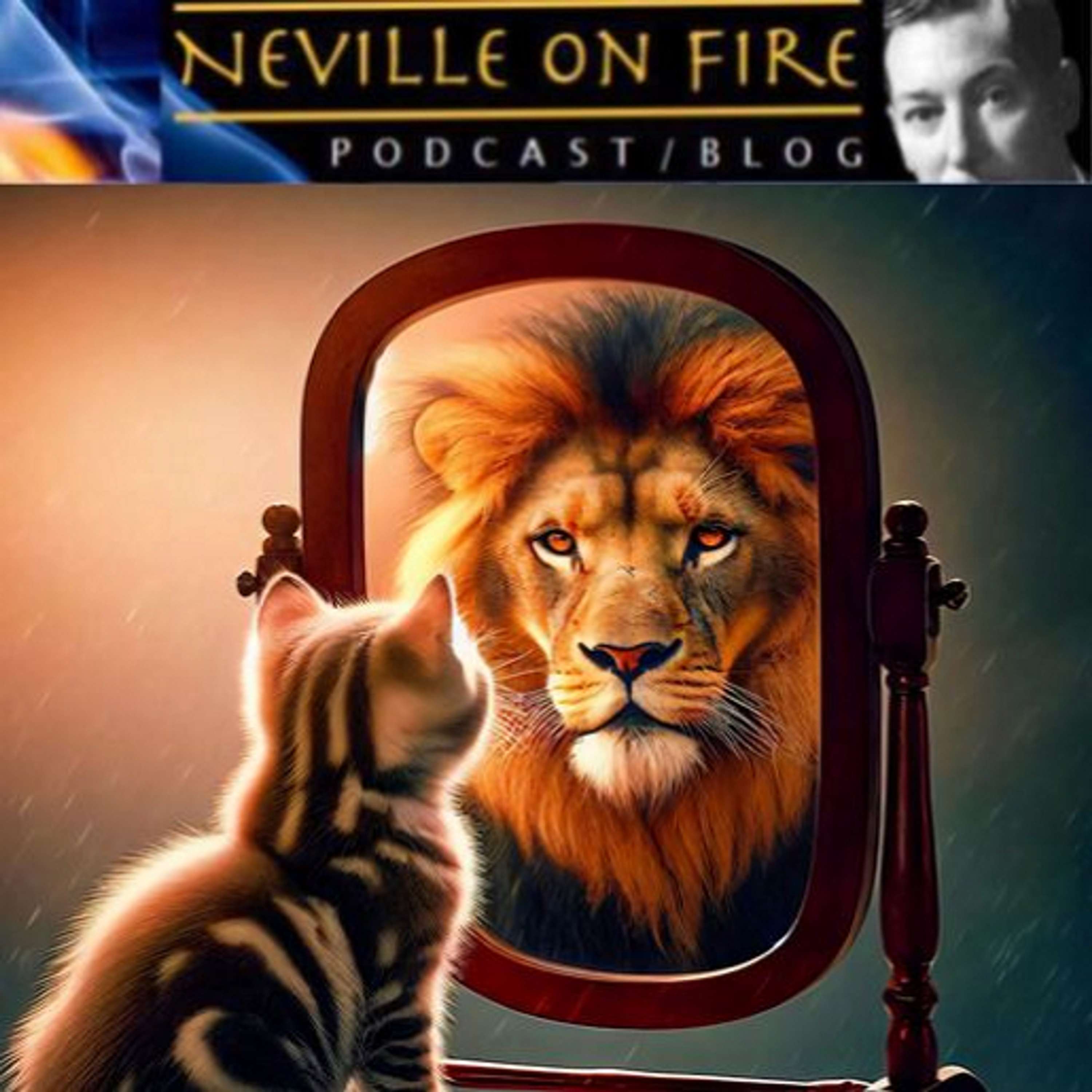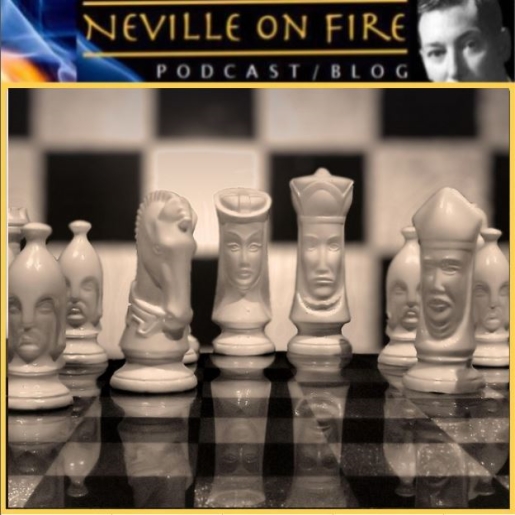Show Notes
SHOW NOTES
Introduction
Neville’s explanation of the 12 Disciples as aspects of the mind occurs in Chapter 18 of Your Faith is Your Fortune. Our purpose is to offer an interpretation and commentary on this extraordinary self-training.
Neville’s introduction
The disciples received the power against “unclean spirits, sickness and disease.” Understanding this psychologically, it means a series of mental practices to revolutionize the mental economy; i.e., leaving behind unworthy content and gaining new standpoints.
“Discipleship” means to awaken and bring to consciousness, to distinct awareness, these qualities, and so to effect a reversal of mind, so that they are no longer harmful and chaotic, but harmonized and beneficial.
1. Simon, later surnamed Peter.
The foundational practice and concept is that of self-consciousness. Notice that Simon is, precisely, this aspect of the mind that “discovers the I AM [awareness of being]...”.
2. Andrew, or courage.
When the “facts of the case”, the apparent conditions of life, do not accord with your concept of what is worthwhile and ideal, then you find yourself in direct opposition to what most people will say is “reality”.
3. James the righteous judge
This is the quality of accurate assessment or evaluation of others.
4. John the beloved
It is the continuation and intensification of the same quality we started with, of “hearing” only the good.
5. Philip
This aspect of the mind understands experientially, not theoretically, how Man (human beings) and God (the creative principle) are related.
6. Bartholomew, the imaginative faculty
The name etymologically means “abounding in furrows” -- obviously, being very fecund or fertile -- an appropriate symbol for the imagination.
7. Thomas, disciplined denial
"You're in denial!" Yes -- in a good way.
8. Matthew, gift of God
Neville gives a fresh view on the nature of desires.
9. James, son of Alphaeus
This capacity of discernment strikes me as a function of higher consciousness.
10. Thaddeus, quality of praise and gratitude
Thankfulness can and must precede the receipt of the gifts prayed for.
11. Simon of Canaan
The human condition is in some respects dire. We can follow Neville’s instructions and put things right.
12. Judas
Entirely reversed from the ordinary understanding. Here is the psychological death, making way for the new person.
KEY QUOTE
“The twelve disciples represent the twelve qualities of mind which can be controlled and disciplined by man.”
(Neville, Your Faith is Your Fortune, Chapter 18)
RESOURCES
Essential
Neville Goddard
Your Faith is Your Fortune, Chapter 18
Freedom for All, Chapter 2
Feeling is the Secret
Repeated
Neville Goddard
At Your Command, Part 1
Mentioned
Robert A. Russell, You Can Get What You Want If You Find it Within Yourself
P.D. Ouspensky, In Search of the Miraculous
Show Transcript
[edited for clarity]
This is E5, 12 Disciplines of Mind (Twelve Disciples).
Well, in this episode, I want to take a look at Neville's explanation of the twelve disciples -- of course, he subjects the whole thing to a psychological interpretation, which is really refreshing. His discussion occurs in chapter 18 of his book, Your Faith Is Your Fortune. And I'll put a link in the show notes.
Now, the information in that chapter is highly concentrated. So our purpose today is to sort of unpack it a little bit, to offer an interpretation and commentary with maybe some practical suggestions. It's probably best to read or listen to chapter 18 of Your Faith Is Your Fortune first. And before we get started, I should emphasize two ideas that I think are foundational. The first one is the practice of awareness of being, as I explained in E1, and the second one is the world view that all is mental, that consciousness is the all, the totality. We explored that in E2.
Neville starts out by saying that the disciples received the “power against unclean spirits, sickness and disease.” Well, understanding this psychologically, I really think it means that it ends up to be a series of mental practices that just revolutionize the mental economy.
Now, he says “the storms and confusions that engulf men can be traced directly to these twelve ill related characteristics”. So that's the interesting thing. These disciples -- disciplines of mind -- are not developed from scratch. Each one actually exists already, but sort of in a nascent or embryonic form. But they are distorted by being unrealized and they're operating unconsciously. And in fact, he says they “permit every rumor and sensuous emotion to move them.” So in other words, these aspects of the mind are, in our present state, completely susceptible to negative suggestion. So in this discussion, what I want to try to do is name the undeveloped or untrained aspect of the mind that is related to each of the disciplines, so that we are better able to identify the habit that has to be transformed.
So just to be clear, the idea is to bring each of these characteristics or nascent traits into “discipleship”, which means to awaken them, to bring them to conscious use. And that way will affect a reversal of mind, so that they're no longer harmful and chaotic, but they're acting in a harmonized way and they're beneficial. And also they're going to be supporting in concert your definite chief aim.
1. Simon, later surnamed Peter.
It's interesting that this is the first one in the series. As I stated in E1, and as I keep pointing out, the foundational practice and concept is that of self consciousness. So notice that Simon is precisely this aspect of the mind that, as he says, discovers the “I am”. Now Simon... the name is associated with hearing, which means, in effect, really a filter. So one might physically hear anything, but we have a measure of control over that exact moment of physically hearing something. We can call on this “psychological hearing”.
The decision [may be] to accept as true, to consent, to, and to allow the thing heard to make an impression on the consciousness. Now, if we reject the thing heard as undesirable, of course you're still going to be aware of it. You still heard it physically, but you choose to remain indifferent, unmoved. And so the thing does not elaborate itself in the subconscious. It simply dissipates.
So this first quality, called Simon, is also called by Neville “faith in oneself”. Of course, he's not referring to an exaltation of the ego. He's talking about participation with the creative source, through self remembering, self consciousness. Practicing “psychological hearing” relies on the understanding that the physical situation, where you hear something from another person or from some other source, is only relatively real. It's not the final word of what is absolutely real. If you want further explanation of that, just go back to E2. That's where I cover that concept in detail.
So what is the incipient form of this quality called Simon before it's called to discipleship? I'm not really sure. Maybe it's what we ironically refer to as “selective hearing”, but in that case, the filter is acting without a consciously directed aim.
2. Andrew or courage.
When the facts of the case, the apparent conditions of life, don't agree with what your concept is of something worthwhile and ideal; in other words, when your aim is not being manifest, then you find yourself in direct opposition to what most people will say is reality. And yet Simon, the first discipline, chooses to remain indifferent. He doesn't accept it. Well, at that moment, Andrew or courage is needed, because in contradiction to a whole lifetime of training, you're making a choice against the evidence of your own senses, maybe in spite of your own reason, and importantly, against what everyone else seems to be doing.
Somewhere Neville exclaims, well, this must be madness to try to do this, because it's only the insane who believe in the reality of their own subjective states! And yet, this is what we're trying to do. But we must say our solitary act to reject what is unlovely in appearance is not insane. It's a conscious, deliberate act.
The other point is about reason. We often say, okay, well, it's [imagining] against your own senses and against reason. But then Neville qualifies the point. He says, must reason always deal with the tangible? Can't you have a reasoned mental action that you carry out based, on your newly acquired understanding of what reality is really all about, how reality is constructed?
So here's an illustration or a little allegory, if you like, of this whole idea of rejecting something that you find does not align with your aim. That's the psychological hearing, the deliberate hearing, that is Simon, the first discipline, then calling up within oneself courage, which is the second discipline.
Think of the three dimensional external reality, what we normally take to be reality, as a movie projected onto what Neville calls “the screen of space”. Now, if a movie in a regular movie theater has an absurd premise, and if it has a bad plot and improbable dialogue, well, you suddenly break the hypnotic effect of the bright screen on your face and you realize that you've actually invested your time, your money, and your mental faculties unwisely into this ridiculous drama.
Now, do you stand up in the theater and rage and rail against it? No, because you immediately recognize that this thing has only a relative reality. It's a concoction of the imagination of the people who made up the film. And despite that, a few moments before, you were in the grip of this thi
So now, with this realization, you have the courage to simply remove your attention from it. And without a need to destroy the screen, you just get up and leave. Maybe you go out to the snack bar and order a coffee and think instead about something entirely worthwhil
All right, so in this little allegory, you've used a higher form of reason, where you conceived the outer scene to have not the quality of an absolute and final reality, but only a relative reality. You see that the higher reality, the causal force, resides actually in the human imagination.
Now, this discipline of courage, as Neville says, “knows what it is to dare, to do and to be silent.” So you dare to go against the evidence of the census. You “do”, that is, you act consciously rather than simply remaining in a passive state. And then, well, to be silent -- beware at this point, because the moment you realize your position vis-a-vis this movie, if you're not silent but you start to protest, the people who are insecure will likely want to take you down. They will point to the movie screen. They'll tell you to shut up because you're interrupting their so-called enjoyment of this movie, even if it's ridiculous or even detrimental.
Now, it's a little odd that the courageous person will choose to be silent, but I believe the reason for that is that you can't reach sleeping people directly. So following Neville's advice, you have to lift people up, in a sense, in the internal conception you have of them, rather than forcing something upon them from the outside. And that in itself takes courage.
At this point, the question arises, what is the standard of truth?
Neville himself says the world is comprised of unnumbered warring beliefs. Further along that line of thought, I think it is possible to decide for oneself to what degree you've been lying to yourself. It is possible to have a standard of truth that is personal so that you realize where you've been deceiving yourself, avoiding certain things, burying certain things, hiding from certain things, and in that way arrive at some personal standard of what you take to be the correct conduct of life.
So what is the reverse or undisciplined side of this trait we call courage? It has to be, of course, cowardice, brought on by fear. There is a quote that I found by author Robert A. Russell. He makes an interesting comment that is relevant here. He said, the most courageous and effective soldiers are not the ones who are wholly without fear. They're the ones who master their fear, give the enemy all they can muster, and then press on to victory.
Neville himself summarizes the first two disciplines that we've been discussing in these words: ”...such a faith develops a courage and strength of character that are beyond the wildest dreams of the undisciplined man.”
The next two disciplines have to do with other people. Neville refers to the other as the “seeming other.”
3. James the righteous judge
This is the quality of accurate assessment or evaluation of other people. Now it's the recognition that each person is expressing the state into which he or she has fallen, not as a result of conscious choice.
4. John the beloved
This quality is joined in partnership with the preceding one. It's the continuation and intensification of the same quality that we started with, of hearing only the good. But in this case it means you're accepting as true only the highest attributes of good that you can conceive of -- regarding other people.
Now, what is the incipient but malformed aspect of mind related to these two, #3 and #4? It's the one that curses and casts aspersions on other people, and judges them with finality, as a result of sort of a narrow self interest, and the inability to separate individuals from the state that determines their behavior.
Now, when understanding things aright, this aspect of the mind reverses itself and releases other people from judgment, and it releases oneself in the process.
5. Philip
This aspect of mind understands experientially, not theoretically, how Man (that's generic Man -- man and woman) and God (the creative principle) are related. Now the Biblical indication, as Neville admits, “seems very confusing.” Here are two quotes from Scripture: “I and my father are one.” tJohn 10:30; and “My father is greater than I” John 14:28.
Here's an explanation. I have the faculty of consciousness. (Now you can experience this with the help of the exercise in E1, if you're not familiar with this concept or this practice). The silent, vivid awareness of being, detached from personality -- this is the unconditioned consciousness, or “the Father” in scriptural terms, the “I am” that is the very name of God, as defined in Scripture.
Now, at the same time, I'm aware of that which I take to be my personal, individualized self -- either this state or that state, this name or that name, this emotion or that emotion, this attitude or that attitude, this role in life or that role. Therefore, I (meaning my condition state) and my Father (the unconditioned or pure awareness) together constitute the person that you see before you.
Of course, the Father, God himself, the one consciousness that we all have in common (that is, the totality that brings life to all of creation) is greater than “I”, my limited conditioned self. So that's the explanation. If you want further words on that, just check Neville's explanation in part one of At Your Command.
What is the unawakened aspect of this faculty? It's the attitude which sees the whole matter literally, completely missing the psychological application to oneself. Such a person will think that an historical personage called Jesus said, “I and my Father are one”, and he was thus describing his relationship with an external orthodox God, sitting somewhere in space, or in heaven, or in the spirit world. And thinking along these lines, you become a theologian, entering into all kinds of arguments about Jesus -- was he divine? was he human?, et cetera, et cetera.
Thank goodness for the psychological explanation, which rescues this lesson from all this sophistry and restores it to an immediate and clear personal experience. So I have awareness of being. Simultaneously, I'm aware of being conditioned in a particular state
6. Bartholomew, the imaginative faculty
The name means etymologically abounding in furrows, in other words, like a farmer's field. So it's a very appropriate symbol for the imagination.
Now, this is one of the most popular aspects of Neville's teaching. You notice, though, he didn't start with it. He embeds it, so to speak, in the midst of all twelve disciplines. So my take on that is that a complete psychological picture is needed. You can't just take imagination out of context.
We introduced a creative exercise in E2. And for those who haven't read Neville's extended instructions on how to use the imagination, I could recommend in particular, Freedom For All, Ch. 2 and Feeling as the Secret, which is a book of only about 33 pages.
What is the undeveloped and unawakened form of this mental discipline? It's the imagination running amok, automatically, mechanically, with people being entirely unaware of its creative imperative. In other words, people don't understand that whatever they impress feelingly upon the subconscious, the subconscious will manifest and deliver back to them in their daily lives. The result is that, unwittingly, people throughout history have created, and are creating now, all kinds of turmoil and confusion by giving free rein to their negative imagination. That's the tragedy of the human condition.
We reverse this by bringing the faculty of creative imagination into conscious, deliberate control.
7. Thomas, disciplined denial
This is the faculty that works hand in hand with discipline number one, Simon, which permits only that which is worthwhile to enter and fully impress consciousness.
Now it takes a deliberate discipline of mind to, first, conceive of external reality as only relatively real, as we discussed above, and as a result, to be able to successfully doubt or deny rumors and suggestions that are not aligned with one's heartfelt aim. In order to do this, the mind has to be self conscious, not passive in its attitude.
The undisciplined, negative aspect of this trait is what we call “denial” in the usual sense. So if I refuse the evidence of my senses, am I not, as they say “in denial”? Not exactly. Being in denial, in the ordinary sense, is hiding away from the undesirable thing, and perhaps even distracting oneself from the pain of it, with some addiction. Even so, you're going to be still secretly convinced that the enemy still exists, even if you're trying to hide from it.
Well, with disciplined denial, by contrast, you use the understanding of how reality is actually constructed. So while staring ugly rumors, suggestions, and appearances full in the face, you assign to them the status of being relatively unreal. So you remove your attention from them and deny them the very conscious attention that they had relied on to remain in your world.
Well, I never thought that being in denial would be a good thing, but now I find that being in deliberate disciplined denial is a very worthwhile thing. It perpetuates a conscious and worthwhile aim. It's a courageous stand against being caught up in some mass hypnosis, and it is informed by a much more refined and subtle view of how reality is actually created.
8. Matthew, the gift of God
Neville gives a fresh view on the nature of desires. He says they are gifts from God, and they arise naturally by virtue of one state or condition, so that's rather a new take on things. The way forward is to honor your desires, as long as one is following the Golden Rule.
Now the negative aspect, or undeveloped condition of this trait, is that desires are judged, suppressed and even condemned.
9. James, the son of Alpheus
This is the capacity of discernment, to see into the realm of causes. So this strikes me to be a function of higher consciousness. The undeveloped aspect of this quality must be, by contrast, not to see with conscious sensitivity, but to unwittingly project something of one's own onto that which is seen.
10. Thaddeus, the quality of praise and gratitude
The important thing to note here is that thankfulness can and must precede the receipt of gifts prayed for. Neville says this quality is “woefully lacking”. It sort of leads me to comment that we might be taking an enormous amount in life for granted. The answer is to realize the miraculous nature of everyday things.
The negative aspect is the usual attitude of being dependent on the outward appearance of a gift [in order] to then believe that it merits thanks. The reversal of mind required is to rest in faith which, is a certainty, a conviction that the thing does already exist in creation.
11. Simon of Canaan. In the Fourth Way it was stated that, were we aware of the number of persons already psychologically dead, walking the streets and governing our lives “we should go mad with horror”. That's from the book In Search of the Miraculous.
Well what is missing in the Fourth Way account of this utterly depressing assessment is the obverse or corollary.
This is where we find Simon of Canaan comes in. This quality of mind sees the positive side of the coin, which is this: we can follow Neville's instructions (with regard to the human imagination) and see if it's possible to put things right. In doing so, we harm no one; we risk nothing, since we are introducing only beneficial and worthy habits into the mental economy; and we're following the golden rule. And the cost is nothing, except our own mental efforts and willingness to release attachments to negative tendencies in our own personal thoughts.
So no wonder the meaning of the gospel in the original Greek is good news.
12. Judas
The aspect that Neville addresses here is the suicide by Judas. And of course it's understood completely differently from the popular notion. In this connection Neville (not here but elsewhere) quotes William Blake who had reported the year of his birth, and then stated that he had died “several times since.” This is the psychological death, the detachment or non identification, that he was referring to. And when you do that, you have room for the new, desired state to be taken on.
I would say the negative aspect of this quality, before it is brought into positive discipline, is to undermine oneself unwittingly by consenting to limiting beliefs, as we discussed in E3. So the proper reversal that we are looking for is to knowingly let go or jettison an identity that is no longer serving us.
This concludes our review of the twelve disciplines of mind otherwise known as the Twelve Disciples.
Listen On
Also Listen
-

Who is Man? Neville’s Radical Answer
Book draft chapter 1. S1E01 revised, inviting your comments.https://nevilleonfir -

The Power of Noticing: How to Interrupt Mechanical Life
Conscious intervention is required for psychological growth. -

Let Go to Move Ahead: Neville and Sedona
First, review of first 15 episodes Season 2. Then explore incremental psychologi -

Conscious Self Persuasion
Science tries to define consciousness where it does not exist, and hypnosis whil


Comments & Upvotes